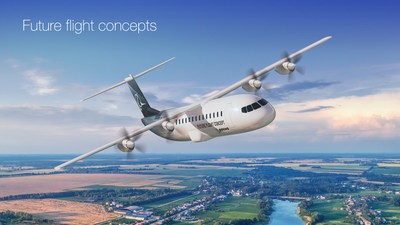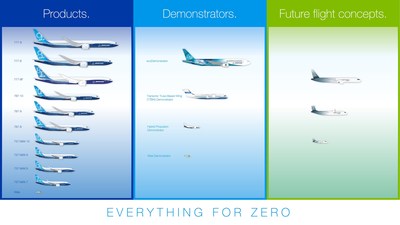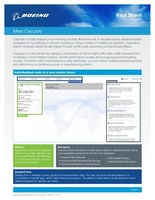Boeing Unveils Model to Show Best Routes to Zero Carbon Future
Boeing (NYSE: BA) has launched a new data modeling tool named Cascade at the Farnborough International Airshow, aimed at guiding the aviation industry toward net zero emissions by 2050. Developed with input from leading universities, the tool evaluates various decarbonization strategies such as airplane fleet renewal, renewable energy adoption, and operational efficiency improvements. Boeing emphasizes a 'SAF and' approach to sustainability, highlighting ongoing innovation in hydrogen and electric aviation, including successful tests of an all-electric air taxi through its joint venture Wisk.
- Launch of Cascade tool to model pathways for achieving net-zero emissions by 2050.
- Collaboration with universities enhances credibility of the modeling tool.
- Demonstration of hydrogen technology and commitment to electric propulsion through Wisk.
- Investment in research partnerships for future sustainable aviation solutions.
- None.
Insights
Analyzing...
FARNBOROUGH, United Kingdom, July 18, 2022 /PRNewswire/ -- As the commercial aviation industry maps a path to net zero emissions, Boeing (NYSE: BA) today unveiled a new data modeling tool to show the most effective scenarios for reaching the destination by 2050. The model includes consultation with leading universities and will continue to be used with key stakeholders. The company also shared illustrative hydrogen and electric concepts that could power the future of flight.
"There are multiple ways to a future where aviation has zero climate impact. We created Cascade on a foundation of credible data and analytical models to allow users to explore various pathways to net-zero. We think this model will help our industry visualize, for the first time, the real climate impact of each solution, from beginning to end, and to inform the most probable and effective strategies," said Boeing Chief Sustainability Officer Chris Raymond at the Farnborough International Airshow.
Raymond demonstrated Cascade, a data modeling tool Boeing created with consulting from leading universities. The tool appraises Boeing's major paths to decarbonize aviation and their potential power to reduce emissions through:
- Airplane fleet renewal
- Renewable energy sources such as sustainable fuel, hydrogen, electric propulsion
- Operational efficiency improvements
- Advanced technologies
The Cascade model assesses the full lifecycle impacts of renewable energy by accounting for the emissions required to produce, distribute and use alternative energy carriers such as hydrogen, electricity, and Sustainable Aviation Fuels (SAF). Boeing plans to utilize the Cascade tool with airline operators, industry partners, and policymakers to inform when, where, and how different fuel sources intersect with new airplane designs.
"We have to take a holistic view to decarbonization," said Raymond. "And when we do that, it is clear that sustainable aviation fuel (SAF) is a necessary lever. We know it will take a 'SAF and' approach and not a 'SAF or' approach to achieving net-zero by 2050."
As part of the 'SAF and' approach, Boeing continues to advance the safety and viability of other renewable energy sources and their use on aircraft. Since the mid-2000's, Boeing has conducted six hydrogen technology demonstrations with crewed and uncrewed aircraft using hydrogen fuel cells and combustion engines. Last year, Boeing successfully tested a cryotank designed for space with the capacity to hold 16,000 gallons of liquid hydrogen or the energy equivalent of the Jet A fuel in a typical regional jet.
Aside from its work on hydrogen applications, Boeing has invested in electric-powered aircraft through its joint venture Wisk, which is working to bring to market the first all-electric, autonomous air taxi in the U.S. Wisk's current all-electric, eVTOL aircraft – on display at the Farnborough Airshow -- has conducted more than 1,600 successful test flights.
Informed by the company's extensive evaluation and testing of alternative propulsion sources and its research partnerships, Boeing today also shared illustrative 'Future Flight Concepts,' depicting potential hybrid, electric and hydrogen-powered aircraft.
"Our common goal is to enable the societal benefits of air transportation while reaching zero climate impact on our planet. To make that a reality, we believe it is best to learn and share our findings broadly, based on a foundation of data, scientific research and collaboration, as we work together to decarbonize aviation," said Brian Yutko, Boeing chief engineer and vice president of Sustainability and Future Mobility.
Learn more about Boeing's sustainability commitments, partnerships and efforts in its recently released 2022 Sustainability Report and on Boeing's sustainability website.
As a leading global aerospace company, Boeing develops, manufactures and services commercial airplanes, defense products and space systems for customers in more than 150 countries. As a top U.S. exporter, the company leverages the talents of a global supplier base to advance economic opportunity, sustainability and community impact. Boeing's diverse team is committed to innovating for the future, leading with sustainability, and cultivating a culture based on the company's core values of safety, quality and integrity. Join our team and find your purpose at boeing.com/careers.
Contact
Lisa Maull
Global Enterprise Sustainability
+314-614-4583
lisa.a.maull@boeing.com
![]() View original content to download multimedia:https://www.prnewswire.com/news-releases/boeing-unveils-model-to-show-best-routes-to-zero-carbon-future-301587854.html
View original content to download multimedia:https://www.prnewswire.com/news-releases/boeing-unveils-model-to-show-best-routes-to-zero-carbon-future-301587854.html
SOURCE Boeing










